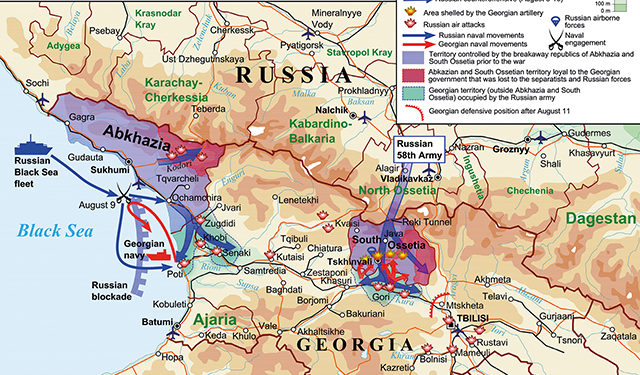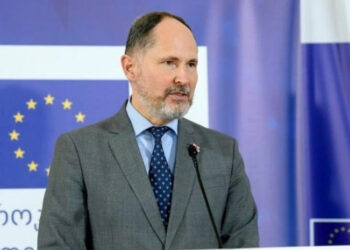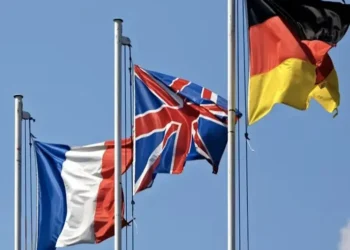Russia’s invasion of Ukraine has not solved Russia’s strategic aims. Pressure on Ukraine will build up further. Moscow’s decision to recognize two separatist entities in eastern Ukraine, however, will further limit other similar separatist territories’ claim for independence.
Russia has never been especially creative in its approach to the neighboring countries. A simple, standard, but ruthless position on dominating the neighborhood has driven Moscow for decades since the end of the Soviet Union.
With Ukraine, it hits a new level. The “Putin Doctrine”, if we might assume such a thing exists, is not about a cleverly-thought out strategy which could gradually bring geopolitical benefits to build upon and present Russia as a reliable and responsible power in Eurasia or globally; rather, the “doctrine” is a deeply idiosyncratic approach to the history of Russia and that of its neighbors. More dangerously, this idiosyncrasy is deeply rooted in the Russian nationalism that what the Soviet Union covered territorially is actually Russia, whether it is the Caucasus, Central Asia or Ukraine – regions which have never been historic Russia. This understanding of history serves as a cover for an offensive foreign policy. If not imposition of direct political control, then Moscow considers the neighborhood as a sphere of its exclusive influence – other powers’ interests and involvement will be tolerated, but only with significant limits (primarily on military and deeper economic cooperation).
On February 21, Russia recognized the independence of separatist the Luhansk and Donetsk “Peoples’ Republics.” Similarities with what Moscow did in Georgia are palpable. Back in 2008, Russia invaded its southern neighbor and recognized the Abkhazia and Tskhinvali regions (the latter often incorrectly called South Ossetia) as independent. But similarities with Ukraine end here. While in Georgia, Russia managed to shrug off the threat of Western sanctions, and the collective West overall was highly hesitant to rupture ties with Russia, Moscow claimed victory both on the military front and diplomatically. Moreover, with Tbilisi remaining antagonistic toward Moscow, strategically, Georgia did not pose any serious threat to Russia. The country’s small size, poor economy and limited military capabilities, plus the occupation of two separatist regions, essentially stripped Tbilisi of ambitions to regain the territories and successfully complete its pro-Western drive. The hesitancy and in many cases dangerous complacency of the West also undermined Georgia’s chances.
With Ukraine, it is strikingly different. Russia essentially re-invaded the country. But with this, Moscow’s strategic dilemmas are not solved, but rather even exacerbated. First, with Georgia serving as an example, the West now is in no doubt as to what Russian military moves in Ukraine amount to. Second, the Russian threat helps solidify the Trans-Atlantic community, which in the past experienced troubles. The Biden administration has so far managed to build a resilient foreign policy by closely cooperating with its European and Asian partners – the lack of which was so tangibly visible in the Trump presidency. We might be witnessing a reversal of systemic troubles in the liberal order, with the decline in cooperation between the Western partners replaced by a re-invigorated push from Brussels, London and Washington to confront Russia in unison. Russian actions also bolster the idea of NATO. Voices questioning the alliance will be heard less often, while the need to strengthen the eastern flank will be more evident.
Furthermore, Putin is also seeing that his military incursion does not guarantee Kyiv will stop acquiring necessary arms for effective defense, or abstaining from cooperation with foreign militaries. Russian leaders thus face a different level of challenge from what they have seen in Georgia. Greater geographic space and a bigger, much better equipped and organized military allow Ukraine to withstand Russian aggression more resolutely.
With its troops now in Donbas, Moscow still sees Ukraine as unfinished business. It has to either push forward with this initial success regardless of what grave sanctions the collective West might impose, or decrease pressure to solidify its position. The latter will have to be only temporary, as in the longer term Ukraine will be drifting more forcefully to the West. This does not necessarily mean NATO/EU granting membership; a range of different cooperation modes could be introduced between Kyiv and the West to complement NATO’s inability to extend eastward.
What Moscow’s recognition of two separatist entities means more broadly for Russia’s sprawling “separatist empire” is a further decline of Abkhazia’s and Tskhinvali’s hopes to garner wider international recognition. With only several states (among them Syria and Nauru) recognizing Georgia’s sovereign territories as independent, Russia’s decision on eastern Ukraine further undermines any remnants of legitimacy it or its dependent separatist entities could argue for. Recognition of separatist lands is now firmly viewed by the world as a geopolitical tool for Moscow rather than a decision based on morality and sincere sentiments (such as towards Ossetians and Abkhazians). It is hardly likely that any state beyond perhaps Syria and possibly Belarus will be willing to recognize four separatist entities simultaneously, and the decision to do so will likely incur sanctions from the US and EU.
Thus, in the longer run, Moscow has buried the Abkhazia and Tskhinvali regions’ chances for recognition, making Russia’s “separatist empire” extremely purposeless.
Analysis by Emil Avdaliani
Emil Avdaliani is a professor at European University and the Director of Middle East Studies at Georgian think-tank, Geocase.














